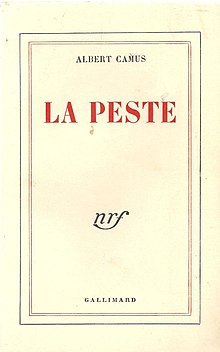 Cover of the first edition | |
| Author | Albert Camus |
|---|---|
| Original title | La Peste |
| Language | French |
| Genre | Philosophical novel |
| Set in | Oran, French Algeria |
| Published |
|
| Publication place | France |
| Pages | 308 |
| ISBN | 978-0679720218 |
| Preceded by | Resistance, Rebellion, and Death |
| Followed by | The State of Siege |
The Plague (French: La Peste) is a 1947 absurdist novel by Albert Camus. The plot centers around the French Algerian city of Oran as it combats a plague outbreak and is put under a city-wide quarantine. The novel presents a snapshot into life in Oran as seen through Camus's absurdist lens.[1]
Camus used as source material the cholera epidemic that killed a large proportion of Oran's population in 1849, but set the novel in the 1940s.[2] Oran and its surroundings were struck by disease several times before Camus published his novel. According to an academic study, Oran was decimated by the bubonic plague in 1556 and 1678, but all later outbreaks (in 1921: 185 cases; 1931: 76 cases; and 1944: 95 cases) were very far from the scale of the epidemic described in the novel.[3]
The Plague is considered an existentialist classic despite Camus's objection to the label.[4][5] The novel stresses the powerlessness of the individual characters to affect their own destinies. The narrative tone is similar to Kafka's, especially in The Trial, whose individual sentences potentially have multiple meanings; the material often pointedly resonating as stark allegory of phenomenal consciousness and the human condition.
- ^ Aronson, Ronald (27 October 2011). Zalta, Edward N. (ed.). "Albert Camus". The Stanford Encyclopedia of Philosophy. Summer 2017 Edition.
- ^ Magill 1989:683
- ^ Bertherat, Eric; Bekhoucha, Souad; Chougrani, Saada; Razik, Fathia; Duchemin, Jean B.; Houti, Leila; Deharib, Larbi; Fayolle, Corinne; Makrerougrass, Banaouda; Dali-Yahia, Radia; Bellal, Ramdan; Belhabri, Leila; Chaieb, Amina; Tikhomirov, Evgueni; Carniel, Elisabeth (2007). "Plague Reappearance in Algeria after 50 Years, 2003". Emerging Infectious Diseases. 13 (10): 1459–1462. doi:10.3201/eid1310.070284. PMC 2851531. PMID 18257987.
- ^ Camus (in Thody, 1970):345. In an interview on 15 November 1945, Camus said: "No, I am not an existentialist."
- ^ Forsdick 2007:119